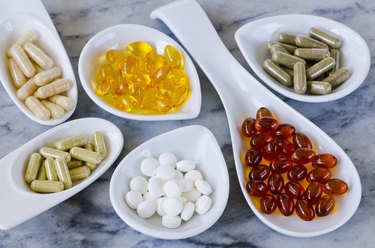
If you've been shedding pounds lately, you may notice a lower tolerance for cold environments and the need for an extra layer or two of clothing. As it turns out, feeling cold when losing weight is totally normal.
"Fat is really like the body's natural blanket. It's a natural layer of warmth and protection in our body," says Sylvia Gonsahn-Bollie, MD, founder of EmbraceYOU Weight and Wellness. "So as we lose our fat stores, we do lose some of that thermodynamic energy —some of the heat that comes along with the fat."
Video of the Day
Video of the Day
Gradual weight loss and realistic body composition goals can help protect you from feeling chilly as you drop pounds.
Tip
If you're feeling cold since losing weight, Dr. Gonsahn-Bollie suggests starting with the basics. "Make sure you get your labs checked so a doctor can see and make sure there are no secondary causes. Tell them you’re feeling cold, get some bloodwork done."
Why You're Always Cold After Losing Weight
Feeling cold after weight loss is a common phenomenon that has several different causes. As fat loss occurs, so do other changes in your body.
"People forget that fat is actually a good thing," Dr. Gonsahn-Bollie says. "Fat is a vital organ in the body, especially when we think about heat generation."
Less Insulation From Body Fat
Low body fat levels may help you look and feel lean, but you need some essential fat for basic function.
A healthy percentage of body fat can range from 10 to 31 percent for people assigned female at birth and 2 to 24 percent for people assigned male at birth, according to the American Council on Exercise.
This essential fat pads your internal organs, absorbs vitamins and acts as insulation. Fat cells also release energy when they sense cold temperatures, which helps keep you warm. When body fat drops too low, you lose insulation, causing you to feel more sensitive to a dip in temperature.
Nutrient Deficiencies
Another cause for feeling cold is a change in dietary nutrients. Weight loss and dieting typically involve eating less food to create a calorie deficit (taking in fewer calories than you burn). You may be unknowingly denying yourself essential nutrients such as iron, vitamin B12 and folate.
"It's important to not eliminate food groups," Dr. Gonsahn-Bollie says. "You do need the nutrients that come from different food sources. If you're following a plant-based eating plan, then you want to make sure you're getting enough iron."
Not getting enough iron can result in anemia, she says, a condition in which your body has trouble producing enough red blood cells, which carry oxygen to your internal organs and tissues. If your coldness also comes with mood changes, fatigue, brittle nails and/or regular headaches, talk to your doctor about your diet and the possibility of doing blood tests to evaluate your nutritional status.
"This is your body trying to communicate something to you. So we need to listen and then do further evaluations," Dr. Gonsahn-Bollie says.
In order to prevent nutrient deficiencies, it's important to eat nutrient-rich foods. Foods high in iron include meat, eggs, leafy greens and iron-fortified foods like milk and cheese, according to the Mayo Clinic.
"If you're following a standard American diet or eating a lot of processed foods, you may be missing some nutrients," Dr. Gonsahn-Bollie says.
Metabolism Changes
Eating in a calorie deficit can lead to weight loss, but too much too soon can have negative consequences. Taking in too few calories in an effort to lose weight might cause cold intolerance, even if you haven't experienced large drops of body fat or weight.
"It can also depend on how rapidly you lose weight. The body's hormones have to adjust to that," Dr. Gonsahn-Bollie says. "It's possible to have fluctuations in your thyroid hormone, which is another big heat regulator in the body as well."
When less thyroid hormone is produced, you migh feel cold. If you're skipping meals or drastically cutting back on carbs, you may have low insulin levels, which can also lower your body temperature.
Sudden changes in your diet and calorie intake increase the possibility of slowing your metabolism and negatively affecting hormone production. Restricting calories too much can cause your body to break down muscle for energy, and, in turn, that reduction in muscle mass slows metabolism, according to the Cleveland Clinic.
What to Do About It
When we're feeling chilly, the first thing we likely do is find a sweater or jacket to warm us up. Besides the obvious solution of wearing more clothes, there are other steps to address this side effect.
If the chill in your bones is due to needing more nutrients, practice adding more whole foods in your diet. "Really look at the quality of the foods you're eating," Dr. Gonsahn-Bollie says. "It might be helpful to add a multivitamin to your routine." If you or your doctor suspects you need a dietary supplement, choose a multivitamin that fulfills your nutrient needs. (Shop our recommendations below.)
Dr. Gonsahn-Bollie also suggests paying attention to when you feel cold. "Sometimes people can feel cold immediately after exercising outdoors when it's cold outside. That's because of your sweat glands opening up. Make sure you have something warm to drink and use warm compresses."
Multivitamins to Consider
Was this article helpful?
150 Characters Max
0/150
Thank you for sharing!
Thank you for your feedback!




